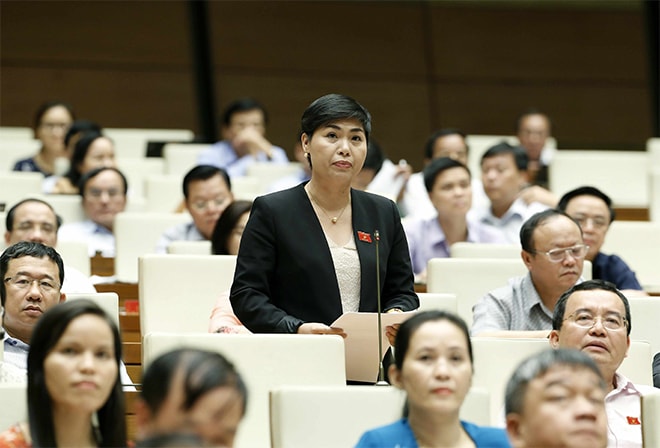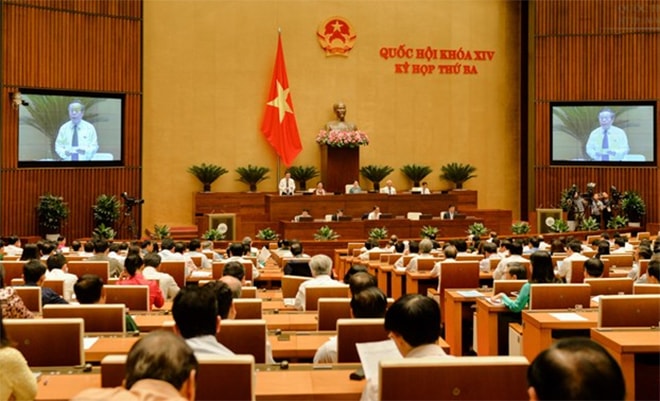Contrasting views on abolishing teacher tenure
During the discussion session that lasted until 6:30 p.m., an unprecedented event, National Assembly deputies expressed concerns about many issues. Some deputies said that if the teacher payroll was to be abolished, it should be abolished throughout the entire system, except for the defense and security sectors, because if it is said that abolishing the teacher payroll will make the education sector better, there is no reason why other sectors should not do the same.
Giving great power to principals, without selection, will lead to a situation of "giving eggs to evil"!
In addition to the economic hot spots, many delegates expressed concerns about education, health care, and social security issues. Delegate Tran Thi Phuong Hoa (Hanoi) criticized the weakness in food safety management, which makes people always worry about their daily meals. Delegates also expressed concerns about the increasing trend of school violence and child abuse.
Citing data from the Ministry of Education and Training, the delegate said: In one school year, there were 1,600 cases of students fighting inside and outside of school nationwide, an average of about 5 cases per day. For every 5,200 students, there was one fight, and for every 11,000 students, 1 student was forced to leave school because of fighting. Even more alarming is that the situation of child sexual abuse is also on the rise and becoming more and more complicated.
 |
| Delegates speaking at the hall. Photo: Van Diep |
Along with that, while the Ministry of Education and Training is planning to pilot the elimination of teacher payroll, Deputy Nguyen Thi Phuc (Hung Yen) said that streamlining payroll causes many problems in educational institutions, when people retire but are not recruited to replace them. "The education sector in some localities has stopped recruiting for a long time, some places have stopped recruiting since 2008, nearly 10 years now, and now it is stuck with the policy of streamlining payroll, causing the love for the profession and the working spirit of contract teachers to decrease, failing to attract good students who love the profession."
In contrast to the above proposal, Minister of Education and Training Phung Xuan Nha said: Most teachers have the mentality of being on the payroll for stability, making it very difficult to improve their knowledge to meet the needs of innovation, leading to a situation where the quality of education is not improved.
“We have just raised the issue of research to propose a pilot project to gradually change from civil servants and public employees to labor contracts... because the area of teachers and teacher management must be especially innovated, because this is a decisive factor in improving the quality of education”. “Resolutely remove from the industry teachers who have not met or do not meet the new requirements. We see this as a very difficult task but we cannot avoid it” – Minister Phung Xuan Nha emphasized.
Disagreeing with this view, Deputy Nguyen Lan Hieu (Hanoi) said that if the teacher payroll is abolished, it should be abolished throughout the system, except for the defense and security sectors, because if we say that abolishing the teacher payroll will make the education sector better, there is no reason why other sectors should not do the same.
“For teachers who teach in precarious schools, on roads that cars cannot reach; doctors and nurses working in mountainous areas... they still try to work because they believe they are still in the payroll, they are still civil servants. Therefore, if we abolish civil servants in education and health, we need very specific policies for each region, taking into account different geopolitical characteristics, to avoid the collapse of the network that takes many years to build. In addition, when giving great power to principals and hospital directors, if there is no careful selection and training, there is a complete possibility of falling into the situation of "giving eggs to evil" - the delegate emphasized.
Fear of having to sell resources to grow
During the discussion session that lasted until 6:30 p.m., an unprecedented event, National Assembly deputies expressed concerns about many issues, but the most prominent were economic concerns, as the Government was determined to maintain the growth target of 6.7% - considered high compared to what has happened since the beginning of the year.
Appreciating the efforts to build a creative government, Deputy Nguyen Tuan Anh (Binh Phuoc) cited the reality that: At the lower levels, some places have not yet accompanied enterprises. “Some enterprises complained that they often have to receive inspection delegations, which overlap and duplicate. A rubber latex processing enterprise in Binh Phuoc province was fined and forced to close its production line for 3 months just because it changed its waste treatment technology in violation of regulations, even though the technology was more modern than the old technology. Afterwards, this inspection unit issued a document canceling the decision to close the line after being strongly protested by the enterprise. The enterprise must bear the damage caused by that arbitrary decision. Just encountering the irresponsibility of some people in the process of implementing the above obligations can make the enterprise miserable and struggling.”
The Government is determined to "heat above, cold below", but some ministries, branches and localities have not followed, the National Assembly also recommended. Administrative procedures are still considered the biggest bottleneck that makes it difficult for the country to move forward. "This is also indirectly shown in the Government's report, when Vietnam ranked 82/189 countries ranked in terms of business environment, although it increased 9 places in 2016" - National Assembly member Nguyen Tuan Anh expressed.
“For every 10 businesses that are born, nearly 9 businesses go away. Obviously, we cannot be optimistic. To achieve the goal of economic growth, we must exploit several million more tons of oil and sell natural resources.”
 |
| The National Assembly discussed in the hall about the socio-economic situation. |
Deputy Phung Duc Tien (Ha Nam) expressed concern that our country's heavy industry is "in real crisis", especially mechanical engineering is regressing compared to decades ago. The forecast for the demand for machinery and equipment in the 2011 - 2025 period is approximately 250 billion USD, but domestic capacity can only meet 30% of the demand, so tens of billions of USD must be spent on imports (in 2015, Vietnam imported 27.57 billion USD of machinery and equipment). Supporting industry is also very weak when the goal of attracting foreign investment to spread technology, management experience through technology transfer and forming a chain of links... is not achieved.
“Currently, we only have about 500 enterprises supplying products for the automobile, motorbike and electronics manufacturing industries, but most of the raw materials for the manufacturing of spare parts and auxiliary equipment must be imported. In fact, the domestic supply rate of raw materials for some key groups and industries such as automobiles is only 20-30%, leather shoes and textiles is more than 10%, which leads to low added value and poor competitiveness of enterprises” – the delegate expressed concern.
The weakening of the agricultural “pillar” also makes the Deputies worried when consecutive agricultural rescue campaigns occur, farmers’ lives are extremely precarious. Deputy Nguyen Ba Son (Da Nang) emphasized: The people’s living standards are the most accurate measure of the Government’s management efficiency and the development of the economy. The Deputies hope that the Government’s next socio-economic reports will show how people’s lives have improved, instead of dry growth figures.
According to CAND
| RELATED NEWS |
|---|
